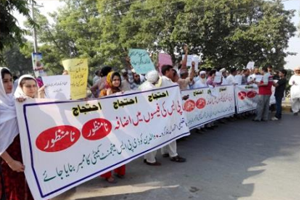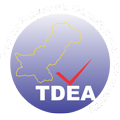When the management of Divisional Public School (DPS), Sahiwal increased the tuition fee by 20% in September 2015, the parents of the students were outraged. It was the third time in a single year that the school’s management had increased the fee. However, both the school’s management and Board of Governors paid no heed to the demand of the parents who viewed this unbridled fee hike as unjust. When the parents’ demand was left unheard, they were left with no choice but to take to the streets.
USAID Citizens’ Voice Project, through one of its partner organizations Punjab Log Sujag (PLS), identified this dispute as a means to strengthen citizens’ voice for enhancing transparency and accountability mechanisms at the district level.
Facilitated by USAID, the PLS team organized an orientation session for the parents to brief them on the Punjab Transparency and Right to Information (RTI) Act, 2013. The orientation was a strategic move in engaging the parents to get the required information from the school’s management to ascertain whether there was any justification for the fee hike.

The PLS staff also assisted the parents in submitting 10 requests under the RTI law. In these requests, the school’s management was asked about the reason(s) for the fee increase, as well as about the amount and frequency of fee increase as per the laws of the Sahiwal Education Trust (the body that regulates DPS-Sahiwal). To further ascertain the validity of the fee hike, the copies of rules and regulations, annual audit, and financial report (2014-15) of the school were also sought.
Meanwhile, the Lahore High Court (LHC) reversed the fee increase by private schools. The court ruled that the school’s management and board of governors, headed by the Sahiwal commissioner, offer a reversal of the fee increase to the parents. However, the school’s management and Sahiwal commissioner were still unwilling to share the information requested by the parents.
The parents, left with no choice but to proceed according to the law, sent reminders to the Punjab Information Commission (PIC) on not receiving the desired information from the school’s management within the stipulated time. Thereafter, PIC sent letters to the school’s principal and Sahiwal commissioner, ordering them to provide the requested information within 13 days.
Even the reproach by PIC failed to move the Sahiwal commissioner. However, the parents continued to exercise their rights as per the Punjab RTI law, which clearly states that it is the public body’s responsibility to share information with those seeking it.
After receiving no positive feedback from the Sahiwal commissioner, the parents lodged another complaint with PIC against the former’s autocratic behavior. On October 28, 2015, PIC directed the school’s principal and Sahiwal commissioner to facilitate the demands of the parents before December 30, 2015. However, this directive was also not paid heed to.
Due to the parents’ perseverance and the threat of punitive measures under the RTI law, the Sahiwal commissioner provided the certified information on January 9, 2016. This struggle, spanning more than 100 days, reflects the efforts of a group of ordinary citizens who got the required information from the division’s highest office using their constitutional right.
USAID’s continuous efforts in facilitating the local civil society to publicize the Punjab Transparency and Right to Information Act, and strengthen transparency and accountability mechanisms, have started bearing fruit. With more and more citizens seeking information under the RTI law, the chances of holding public servants accountable are getting brighter, paving the way for improved and responsive governance.




















